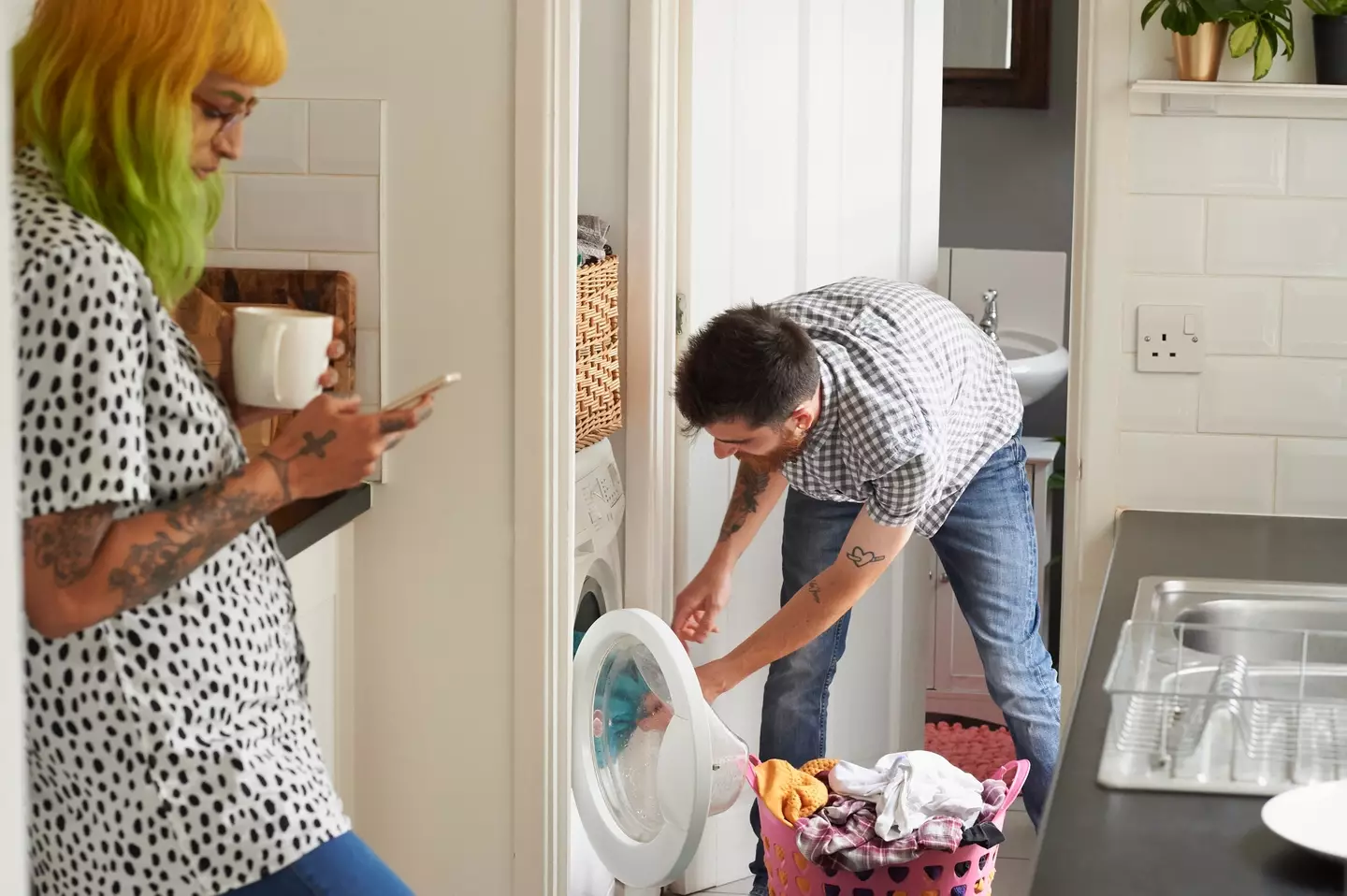
A sex therapist who’s spent two decades working in the field has spoken about the four things you should never do in the bedroom.
Vanessa Marin, from California, has taken to social media where she shared four pieces of advice for couples.
.jpg)
Vanessa shared the four things you shouldn’t do in the bedroom (Getty Stock Photo)
Speaking about her own relationship, Vanessa – who goes by @vanessandxander on the platform – explained: “For Xander and me, it’s taken us many years to figure out what a supportive, compassionate and accountable relationship looks like for us.
“Remember, you are a team, and you can work together to create a relationship that feels even more supportive and compassionate.”
In the video, Vanessa listed the four big no-nos, urging others to show kindness to themselves and their partners.
Initiating sex
Vanessa first explained that she would never expect her husband to always be the one to initiate sex, just because ‘he’s the man’.
“No way,” she explained in the clip.
Not only have a number of studies suggested that men like it when their partner initiates sex, but it turns out that women want to initiate sex a lot more than they do.
According to Wonderlust, women often feel like there are social, cultural and biological factors holding them back.
No pressure
Equally, Vanessa says she’d never pressure her partner if he wasn’t in the mood to have sex.
Everyone’s libido fluctuates day-to-day, and making your partner feel bad if they don’t want to have sex is a huge no-no.
.jpg)
Vanessa explains that women should feel able to initiate sex too (Getty Stock Photo)
Communication
Vanessa says she’d never keep quiet about what she would like in the bedroom, out of fear she’d be hurting her partner’s feelings.
“Be sure to discuss new boundaries and expectations with your partner in a patient, respectful, and intentional way, and go slow! Don’t expect transformative change overnight,” she explained.
According to studies, partners who communicate more about their sexual desires and preferences had higher levels of sexual satisfaction than those who do not.
Be empathetic
Another huge bedroom faux pas is having a negative reaction to a partner’s performance issues.
Vanessa says she would never ‘make it about me’ and used ‘crying’, ‘pouting’ and accusing her partner of not being attracted to her as an example.
Erectile dysfunction is common, with over half of men aged between 40 and 70 experiencing some form of ED.
In a recent study by Superdrug, 23 percent of women whose partners had ED said they believed it had ‘something to do with them’, with 14 percent admitting their confidence suffered as a result.
However, 60 percent said it did not affect their relationship.

For those of you in relationships, you may be familiar with some of the things that you should steer clear of saying at all costs.
Healthy couples fight every now and then, with disagreements being normal in any relationship.
In fact, according to a 2018 study, couples who argue effectively are 10 times more likely to have a happy relationship in the long-term.
But there are a number (10 to be exact) of phrases and key words that you shouldn’t use as they could kill your relationship, according to a number of experts – it could be
Here are the 10 things you should avoid saying to your significant other, according to Chartered counselling psychologist and Counselling Directory member Jeanette Fegan, who shared them with iNews.
“You’re overreacting”
Fegan explains that this kind of communication can be invalidating and hurtful, leading your partner to thinking that their ‘voice is not important’.
In fact, saying something along the lines of ‘You’re overreacting, as usual’, could signal traits of gaslighting, which involves dismissing a person’s emotions, making them doubt themselves.
The counsellor tells iNews: “Instead of dismissive statements, adopt a curiosity as to why your partner said or did what they did, so you can better understand them and they you.”
“You care about [something/someone] more than me”
Certified life coach Lorena Bernal says this type of statement can be hurtful, as it assumes your partner’s feelings and accuses them of things, and you risk invalidating the love they show you.
“This can lead to a defensive response, where they feel the need to justify their actions and priorities, rather than focusing on addressing the underlying feelings or concerns you might have,” Bernal explains.
She urges couples to let each other know if they’re ‘feeling neglected’ or ‘need more support or attention’ without playing the blame game, allowing space for understanding.

Getty Stock Photo
“You never listen”
Bernal states: “It’s unlikely that your partner never listens to you, so making this statement inherently hyperbolic and inaccurate.”
She explains that this can put the other person on the defensive, and implies a negative judgement of your partner.
The counsellor suggests you say something like ‘I feel upset when I don’t feel heard. Can we discuss this further?’, as it doesn’t frustrate your partner and creates a constructive conversation.
READ MORE:
THE ‘FOUR HORSEMEN’ RULE THAT MEANS YOUR RELATIONSHIP IS COMING TO AN END
EXPERT EXPLAINS WHAT ‘ORANGE PEEL’ RELATIONSHIP THEORY ACTUALLY TESTS
“That’s not true – you’re being ridiculous”
You could be accused of infidelity or questioned about a relationship with a colleague, but your partner has put themselves in a vulnerable position by sharing these thoughts.
Love and relationship coach Heather Garbutt explains to iNews: “When you’re exploring a difficulty, it’s always important to understand how the other person experiences the situation.”
She highlights that it is important to validate the other person’s feelings and show that you understand where they are coming from.
“This is just like before, when you did…”
Bernal says that bringing up ‘past conflicts during a current disagreement’ can delay and hinder the resolution process, negatively affecting the emotional climate of the relationship.
Saying something like that can lead to overreactions, as the focus of the argument is shifted to something else, not the immediate problem.
It effectively derails the conversation and takes the focus away from a resolution.
“It can make your partner feel as though they’re constantly under scrutiny and that past mistakes will never be truly forgiven, undermining trust and security within the relationship,” Bernal explains.

Getty Stock Photo
“I told you so”
Ah, the age-old phrase.
Eldin Hasa, a neuroscientist and human behaviour expert, states: “Using this phrase implies a sense of superiority and undermines your partner’s self-esteem.
“Neurologically, it triggers the stress response, hindering effective problem-solving and communication.”
Hasa advises that you collaborate instead of compete, and create a supportive environment where you can grow from mistakes.
“You’re such a [insulting name]”
Sometimes, you can lose your cool and break out the swear words or rude names, but Fegan says that this tactic can cause serious damage to your relationship.
“This can create a hostile environment where your partner, and ultimately yourself, feel unsafe and undervalued,” she explains, also highlighting that if there are children in the relationship, they will internalise this negative belief.
It damages your partner’s self-esteem too, and if repeated, it can make it difficult to resolve any problems in a healthy manner.
Fegan concludes: “Essentially it is crucial to communicate your needs to your partner with empathy, and choose words where the person owns their feelings.”

Getty Stock Photo
“Why can’t you be more like…?”
Hasa explains that comparing your partner to someone else ‘can be hurtful and damaging’, potentially leading to ’emotional distress and strained relationships.’
By saying this, you damage your partner’s ‘self-worth and confidence’, says Fegan.
“They are likely to believe that they are not good enough. This will then likely result in people pleasing behaviour; they will try and do whatever the person wants to feel ‘good enough’.”
Though it may seem OK, it can lead to a feeling of resentment later in the relationship, and more conflict.
In a relationship, you have to accept each person for who they are.
“If you don’t do *this*, I’ll leave”
Threats are a straight no-go in a healthy relationship, as Fegan says these ultimatums are ‘a toxic and harmful tactic that will damage the trust of the relationship’.
Unless you actually will follow through on the threat, the behaviour will prove detrimental to the relationship.
It comes across as one person trying to be in power and control over the other, through fear and coercion.
It will not create an environment of open and honest communication as the partner may become fearful of sharing their feelings and opinions.
Fegan concludes: “They live in a state of fear which can have a detrimental impact on their physical and mental wellbeing.
“Any concerns should be discussed in an open and honest way, finding solutions that are mutually beneficial.”

Although one might come in handy for a few couples, there isn’t a rule book for relationships.
You might have already learnt plenty of lessons on love before you struck up your latest romance, but you can’t take a one-size-fits-all approach when it comes to dating, as everyone’s version of a good partner is different.
However, there are some techniques which you can refer to which could help you keep your love life on track.
Some couples swear the 80/20 rule is the secret to their longevity, while others reckon that the 7-7-7 method is what has kept their spark alive – and according to this expert, knowing when to keep your mouth shut will also work wonders.
Marriage and family therapist Shari Foos explained that ultimately, the success of your relationship depends on how well you communicate with one another.
“Before you speak, take a beat to consider the impact of what you want to say,” Shari, who is the founder nonprofit group program, The Narrative Method, which aims to combat the ‘epidemic of loneliness’, told Good Housekeeping.
“Try to anticipate how the information might make your partner feel, so you can show empathy to them while expressing what you want to say. Try writing out what you want to communicate from your perspective.
“Then edit it until you feel you can say it compassionately without skirting the truth.”

Experts say the way you communicate with your partner is key to a long-lasting relationship. (Getty Stock Photo)
So, if you want to avoid any trouble in paradise, take a look at what these relationship experts recommend to never utter to your other half – or on your head be it.
‘I don’t care’
You might think you look really cool and unbothered by saying you simply ‘don’t care’ about your row, but Shari says you shouldn’t say it unless your really ready to call it a day.
She explained: “Even if that’s how you’re feeling in the moment, even if you’re ready to break up, why bother having a conversation if you don’t want to try to understand each other?
“It’s not worth the temporary relief of blurting out your feelings when you’re putting your partner’s vulnerability and the future of your relationship at risk.”
She suggests ‘choosing your words’ wisely and being hyper-vigilant about what your body language is showing.
‘You’re overreacting’

It’s important to validate your partner’s feelings (Getty Stock Photo)
Psychologist Catherine Nobile told the publication that dismissing their emotions instead ‘comes off as blaming’.
“It shuts your partner’s experience down and effectively sends the message that they are the problem,” she said.
Instead, sit down with your partner and listen to what they have to say, while ensuring that you are being receptive to their honesty.
‘It’s none of your business’
Although keeping your cards close to your chest might have been all cute and mysterious when you were single, you can’t expect the person you’re romantically involved with to not want to know the ins and outs of your life.
But if you tell them to keep their nose out, don’t be surprised if they suspect that you have something to hide.
Amy Lorin, a psychotherapist and author, pointed out that you can still retain your independence and privacy, however, chucking out this line during an argument will only breed distrust as ‘secrets can be harmful’.
She said: “If you want to keep something private, explain that you don’t want to share a social media password, or you aren’t going to talk about a private conversation you had with a family member because you’re setting a boundary surrounding your privacy, not because it’s not their business.”
‘Maybe we should split up’
New York-based relationship therapist Stephanie Manes advised couples to steer clear of suggesting a break up if you are trying to get your significant other ‘to take your complaints seriously or to change in the direction you want them to’.
“In a moment of intense frustration or hopelessness, it’s a natural reflex to say. ‘I give up!’ But if you keep saying it, you amplify the feeling that your whole relationship is on shaky ground,” she explained.
Rather than teasing the fact that you could walk away from them, concentrate on addressing the issue at hand.

There’s a way to go about raising issues, such as sharing more responsibility, with your other half (Getty Stock Photo)
‘Why do I have to do everything?’
We all want to feel as though our partner lightens the load and that it is the two of you against the world – but if one is pulling their weight more than the other, resentment will soon arise.
Morin said: “You’re discounting everything your partner contributes to the relationship. It won’t motivate them to change their behaviour. Instead, it implies you’re a martyr and they’re taking advantage of your kindness.”
‘Why can’t you be more like my ex?’
They say that comparison is the thief of joy – so why on earth would you want to pit your new partner up against your ex?
Manes reckons this is a real ‘low blow’ which puts your other half ‘in competition’ with your former flame.
She explained: “It creates relationship insecurity and decreases the likelihood that complaint will ever actually be heard.”
Nobile added: “Comparisons can also breed jealousy and resentment toward the person they are being compared to, adding unnecessary tension to the relationship.”
Try seeing the good in your partner and all their amazing qualities – because at the end of the day, it didn’t work out with your ex for a reason.

Sneaking low blows in the heat of the moment will just leave you both upset (Getty Stock Photo)
‘It’s all your fault’
Shifting the full blame onto one party when your relationship hits the skids isn’t exactly fair.
“It takes two people to contribute to problems and both people have responsibility for repairing them,” Morin said.
You’re meant to be a team, so see how you can help the other combat whatever issues they need to overcome by preparing a plan of action together.
‘You’re…*insert expletives*’
Calling your boo every name under the sun is never going to hold your relationship in good stead.
Nobile explained: “Speaking to a romantic partner with contempt is the largest predictor of ending a relationship.
“By speaking to your partner as though they’re beneath you, you are attacking safety, trust and respect in the relationship.
“Research shows that contempt has negative effects on physical, psychological and relational health.”
‘You always…’ or ‘You never…’
It’s easy to exaggerate during the heat of the moment and imply that they ‘never’ do romantic things for you and ‘always’ prioritise other things over your relationships, but in reality, this is often not the case.
You wouldn’t remain together if that was in fact true, but repeating these sentences to your partner will likely make them think that you only see the negatives, rather than any positives.
Manes explained: “Making broad, sweeping, negative statements about your partner suggests that you only see what they do wrong, not what they also get right.
“And it’s an open invitation for them to argue why your statement isn’t true. In either case, you miss the chance to have them actually listen to you.”
Foos added: “If the same issue continues to arise and it remains unsettled then the two of you have to put yourselves aside to appreciate each other’s thoughts and feelings.
“We have to humbly appreciate that we can never truly know what another person is feeling no matter how well you think you know them or how many times you’ve been through ‘this same issue’.”

An expert has devised nine questions you should always ask your date in order to make sure they’re in it for the long-haul.
Dating in 2024 became a bit of a minefield, let’s not lie. With new dating trends left, right and centre, it’s no wonder people’s priorities are switching up.
According to dating app Bumble, singles in 2025 are going to have a huge focus on ‘future proofing’ their relationships. And 95% of singles said their hopes for the future impacted who exactly they chose to date.
First dates are pretty much always awkward, and coming up with conversation can often be a struggle.
But professional relationships counsellor, known as Therapy Jeff on TikTok, has come up with a list of nine questions you should definitely be asking.
Unless of course it’s a one-off thing, in which case, ask what you like!

A relationship expert has devised a list of questions for a first date (Getty Stock Images)
Does anyone else think they’re in a relationship with you right now?
I mean, it sounds ridiculous, but in the current dating sphere, it’s definitely not ruled out.
Saying you’re not in a relationship is one thing, but having a situationship in the background who may feel differently about your status, is another.
This question simply rules out any unwanted surprises a little further down the line.
What’s your definition of cheating – both physical and emotional?
It seems that everyone’s definition of cheating is extremely different.
Jeff said: “Be very clear here, because sometimes we have wildly different ideas of what counts as cheating.
“Talk about flirting with other people, liking hot babes on social media and watching spicy videos.”
What one person thinks is totally acceptable, may be a deal breaker for another person.
What kind of relationship do you want?
With more relationship dynamics floating around than ever before, this one is important.
Jeff added: “Monogamous? Monogamish? Poly? Do you want to open it up in the future? What’s the plan? Do you even want a plan?”
They’re all fair enough questions to ask.

Asking the right questions is important (Getty Stock Images)
How do you feel about living together eventually?
While it feels a bit heavy for someone you met in a bar half an hour ago, Jeff explains that establishing goals is important.
He said: “Is it a goal for you or would you prefer something like living apart together? Do you see moving in as just testing the waters or does it mean we’re definitely on the path to marriage?”
What kind of wild stuff are you into in the bedroom?
Jeff said: “You just want to understand what to expect as things heat up. It might give you something to look forward to or time to mentally prepare and get on board.”
Or even decide it’s completely not for you!
What’s your biggest worry about us?
“You probably have some concerns about where things might get tricky, put them on the table and see if you can talk through them,” the counsellor explained.
Everyone’s communication styles are different, and knowing how much or little reassurance a person needs, is handy information from the get-go.

Understanding each other’s needs is key (Getty Stock Images)
Are you prepared to be my primary emotional support?
If you’re looking for a long-term relationship, knowing you can lean on a person is extremely important.
Also letting your potential partner know what you need from them in that moment.
What are you giving the most energy to right now?
Understanding your date’s priorities and interests will be helpful down the line.
Jeff explained: “Understanding this can change but, is it school? Work? Creativity? This relationship? Family? Friends? Partying?”
What do you think is important for me to know as we move forward together?
The counsellor said: “This one is open ended for a reason. See where they take it, it often leads to really honest and insightful answers.”
Starting a relationship without skeletons in the closet is probably the right idea.

You might think you know everything there is to know about your partner, but have you ever actually put your relationship knowledge to the test?
Couples often get caught up in the honeymoon phase when they’ve just started dating and forget to ask the important questions.
And when reality sets in, people often realise that they’ve formed a connection with someone without even finding out what the name of their first pet was.
These tidbits of information might seem trivial, but learning all of your significant other’s quirks, likes and dislikes is essential if you want a long-lasting relationship.
You don’t have to know every aspect of their life story, but having a good idea of their background and experiences is the bare minimum, according to this therapist.
Jeff Guenther, who is better known online as TherapyJeff, believes that people should know their romantic partner well enough after hitting the 12-month mark.
The expert – who specialises in marriage and family therapy as well as child development – reckons that it might be a red flag if you’re still getting introduced to new things about your romantic partner a year down the line.
I mean, to be fair, what the hell have you been doing for the last 365 days if you’ve not been getting to know one another?

Jeff Guenther believes couples should be experts on each other after a year of dating (TikTok/@therapyjeff)
The 12 Questions
If you want to see how familiar your other half is with all the crucial facts they should know about you, Jeff’s got the perfect quiz for you to try out.
He has helped hundreds of couples work through their issues at his private therapy practice in Portland, Oregon, over the years – so he knows his stuff.
Due to his experience assisting couples navigating treacherous waters and educating young lovers, the therapist believes he has gained a good idea of what an authentic relationship should be like.
It’s not all sunshine and rainbows, according to the Big Dating Energy author, but if you work on your trust, communication, support and intimacy, it’s worth it in the end.
That’s why he came up with a Mr and Mrs-style quiz which will help you understand if you and your partner are on the same page.
In a video shared to TikTok, Jeff said: “You should be able to answer these 12 questions after dating someone for one year.”
Take a look at the list of questions below, which we’ve divided into different categories.

Quiz your partner on these 12 questions to see how well they know you (Getty Stock Photo)
Wants and needs
- What’s something in the relationship that makes them upset that they just can’t quite get over or let go of yet?
- When they need support, what works best? Being hugged, heard, helped or humped?
- What is their favourite emotional support food?
- What personality quirk, physical gesture or turn of phrase have they picked up from you and now use regularly?
Nearest and dearest
- What is their overall feeling about each person in their immediate family?
- Who is their best friend and why is that their best friend?
- What is their biggest fear or insecurity and how does it show up in their life?
- What’s their go-to way to destress after a really bad day?
The future and feelings
- What’s their opinion on their career or current life path? Are they content, conflicted, or craving change?
- What’s one thing about you that they secretly love, but would never openly admit?
- What’s the one boundary they are most protective of and why is it so important to them?
- What’s the one topic that’s guaranteed to make them rant for at least 15 minutes straight?
Jeff urged people to give the questions a go with their significant other, while social media users flooded the comment section with their thoughts.
One said: “Me and my husband just had a great conversation going through this list. Thank you!
Another wrote: “This is really sweet. I need someone to know me like this.”
A third chimed in: “How can you not know this about your partner after three weeks?”
A fourth joked: “I suppose after 15 years, I ought to nail this down.”
And a fifth added: “Perfect score for both of us…at 18+ years!”
So…what are you waiting for? Go and tell your beau you’ve got 12 questions to quiz them on!



